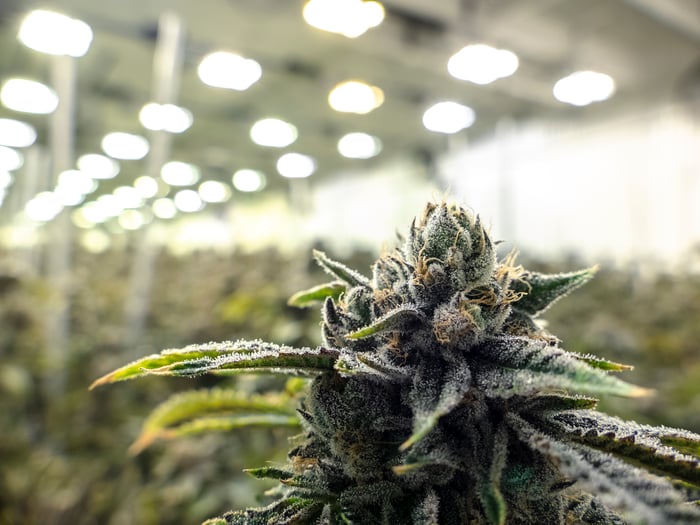For more than a decade, growth stocks have outperformed on Wall Street. The combination of historically low lending rates and ongoing quantitative easing measures from the nation's central bank have allowed fast-growing companies to hire, acquire, and innovative with ease.
But over the very long-term, the data conclusively shows that dividend stocks are the real outperformers. According to a J.P. Morgan Asset Management study released in 2013, companies that initiated and grew their payouts over the course of four decades (1972-2012) delivered an average annual return of 9.5%. That compared to a meager average annual return of 1.6% for companies that didn't pay a dividend.
Now, imagine if you could get the best of both worlds – i.e., a fast-growing company that's been able to take advantage of historically low lending rates and a board of directors intent on sharing some of the company's profits with its shareholders.
The following trio of companies are some of the fastest-growing dividend stocks on the planet with a payout of at least 2%.

Image source: Getty Images.
AstraZeneca: 2.4% yield
Whereas most pharmaceutical stocks are slow-and-steady cash cows, Big Pharma AstraZeneca (AZN 1.21%) has turned itself in a growth stock that also divvies out a market-topping yield of 2.4%. AstraZeneca's secret sauce is a combination of rapidly growing specialty therapies, as well as a game-changing acquisition.
On the organic growth front, four brand-name drugs are leading the charge. Within its oncology division, the trio of Tagrisso, Imfinzi, and Lynparza have been growing sales by a double-digit percentage, which helped push cancer-drug revenue higher by 20% in the first quarter to just over $3 billion. Meanwhile, sales for next-generation type 2 diabetes drug Farxiga soared 50% in the first quarter, with annual run-rate sales of $2.5 billion. These brand-name products should help oncology and cardiovascular segment sales rise by a double-digit percentage through mid-decade.
From an acquisitive standpoint, AstraZeneca is in the process of purchasing ultra-rare-disease drug developer Alexion Pharmaceuticals (ALXN). The deal should close sometime this quarter. Although it's risky for Alexion to develop treatments to target patient pools often measured in the thousands, the reward when a drug is successful is no insurer push back on high list prices and nonexistent competition.
What AstraZeneca is going to love about Alexion is the company's diligence in creating a next-generation replacement therapy for its blockbuster drug Soliris. The replacement, known as Ultomiris, is administered less frequently than Soliris, and should over time gobble up most of Soliris' revenue, assuming its label expansion continues. This'll secure Alexion's cash flow for a decade to come, allowing AstraZeneca to invest in innovation and handsomely reward its patient shareholders with superior payout.
Between 2020 and 2025, it's possible AstraZeneca's revenue could double.

Image source: Getty Images.
Innovative Industrial Properties: 2.8% yield
Another bona fide growth stock that's paying out a market-topping dividend yield is cannabis-focused real estate investment trust Innovative Industrial Properties (IIPR 2.00%).
Without getting overly technical, IIP, as the company is known, acquires medical marijuana cultivation and processing facilities with the intent of leasing them out for long periods of time. Even though acquisitions are the primary source of growth for the company, it does have a modest organic growth component built in via annual rent increases of more than 3% and a 1.5% property management fee that's tied to the annual base rental rate.
As of July 6, Innovative Industrial Properties owned 72 properties spanning 6.6 million square feet of leasable space in 18 states. All of its properties were fully leased, with a weighted-average lease length of 16.7 years. With the company very likely netting a complete payback on its $1.6 billion in invested capital in probably seven or eight years (if not sooner), IIP should be an income gravy train for its shareholders.
It also doesn't hurt that federal cannabis reform in the U.S. has gone nowhere. As long as marijuana remains illicit at the federal level, access to basic banking services will be spotty, at best, for U.S. multistate operators (MSO). Innovative Industrial Properties has stepped in with its sale-leaseback program to ease this issue. IIP has been acquiring properties for cash and immediately leasing them back to the seller. This way MSOs get the cash they need, while IIP lands a long-term tenant.
After reporting $116.9 million in revenue in 2020, Wall Street is looking for almost $269 million in revenue by 2022, making it possibly the fastest-growing dividend stock on the planet.

Image source: Getty Images.
Broadcom: 3.1% yield
If you're looking for growth and supercharged income potential, semiconductor company Broadcom (AVGO 1.32%) is a strong candidate to consider buying. After averaging double-digit annual sales growth in the years leading up to the pandemic, Wall Street is expecting revenue growth to average high single-digits through mid-decade.
At the heart of Broadcom's success is the 5G revolution. It's been a decade since we've witnessed a major upgrade to wireless infrastructure, which suggests that consumers and businesses will be eager to update their devices to take advantage of faster download speeds. Broadcom generates a significant portion of its revenue making the 5G chips and accessories used in smartphones. In short, we're talking about a multiyear heightened demand runway for the company.
In addition to the 5G cycle driving sales higher, Broadcom also finds itself at the center of a data shift. Since the pandemic struck, businesses have been forced to push online and into the cloud in order to stay connected with their client and employee base and keep projects on track. As this push into the cloud accelerates, storage demand will increase. Broadcom, which supplies connectivity and access chips used in data centers, will be a no-brainer beneficiary.
But maybe the real standout for Broadcom is the company's payout. A decade ago, the company was parsing out $0.09 per quarter to its shareholders. But as of the most recent quarter, its investors were netting $3.60 ($14.40 annually). That's a 3,900% increase in its quarterly payout in 10 years. Few, if any, tech stocks offers a more attractive income/growth profile.





